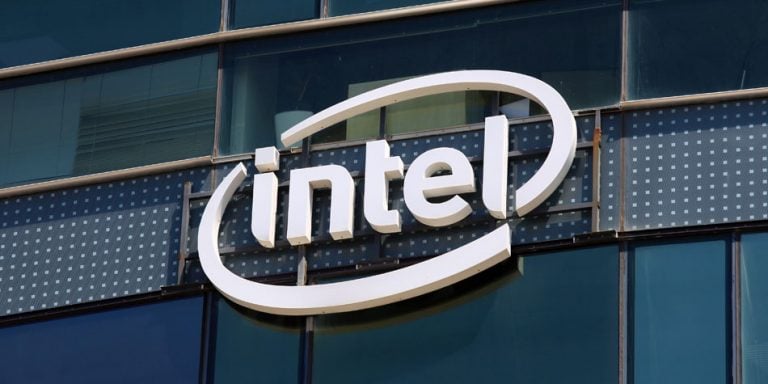Intel Corporation (NASDAQ:INTC) shares fell as much as 6.6% on Wednesday, after technology website The Register reported Intel chips contain a significant design flaw. After Intel publicly responded, Intel stock managed to regain nearly half of those losses. Yet INTC still closed trading for the day off 3.4%.

I’ve been bullish on Intel stock for some time now. But Wednesday’s news changes the case here. It’s not immediately clear that the bug necessarily will cost Intel a significant amount of cash, at least in the near term. But it does potentially undercut the optimism Intel had been building over the past few months, as Intel stock raced from $34 to $47 before a recent pullback.
Admittedly, it’s too early to panic. But with Intel’s competitors gaining on the news, and with INTC stock still up ~30% from August levels, investors ignore the concerns raised at their peril.
Is The Intel Flaw Real?
The report from The Register highlights a bug present in Intel processors going back a full decade. Essentially, the Intel architecture is set up in a way such that data in the “kernel” can be accessed. That kernel is the heart of the code running the operating system – whether it’s Microsoft Corporation (NASDAQ:MSFT) Windows, open-source Linux, or Apple Inc. (NASDAQ:AAPL) macOS. That code is put in the kernel to be protected from user error and other factors.
But according to The Register analysis, the flaw in Intel’s hardware could allow malware to read that code from a distance. That’s a huge problem, because kernel memory, as the site wrote, “may contain all sorts of secrets, such as passwords, login keys, files cached from disk, and so on.” A patch is needed to prevent hackers from viewing that important data.
Intel responded to the report with a conference call and a statement essentially denying its veracity. “Recent reports that these exploits are caused by a ‘bug’ or a ‘flaw’ and are unique to Intel devices are incorrect,” the company wrote. It argued that “many types of devices” were at risk — including those from rivals like Advanced Micro Devices, Inc. (NASDAQ:AMD) and
ARM Holdings plc (ADR) (NASDAQ:ARMH).
But AMD has denied that its chips are vulnerable. The Register pointed to an email from an AMD engineer sent on December 26th, saying that AMD’s microarchitecture closed the alleged hole. AMD itself said on Wednesday that “there is a near zero risk to AMD processors at this time.” And so far, the market appears to believe AMD, and not Intel. While Intel stock slumped, AMD gained 5.2%, and datacenter rival Nvidia Corporation (NASDAQ:NVDA) 6.6%.
Does the Bug Matter for INTC Stock?
If The Register report is true, the question is whether the bug impacts Intel stock — and how much. Patches for the issue already are being rolled out by major OS players. It’s not as if Intel is headed for some nightmarish future where every device with an Intel chip needs a replacement.
Still, the flaw likely will cause serious problems for Intel. The early denial and what looks erroneous finger-pointing at AMD will reflect poorly on the company if the flaw is bigger than Intel is admitting at the moment. Intel said it had planned to disclose the issue next week — but knew about it as early as June, according to reports. CEO Brian Kraznich sold millions of dollars’ worth of stock after being informed of that flaw, a move reminiscent of the stock sales at Equifax Inc. (NYSE:EFX) before its massive breach was announced.
Even the patches will hinder performance going forward. And history shows a potentially painful cost. Intel’s famous “Pentium FDIV” bug, discovered in 1994, cost the company nearly half a billion dollars — $1 billion-plus in today’s terms. The damage here could be higher given just how widespread the hardware-based problem could reach.
Most notably, the news is particularly problematic for Intel from a competitive standpoint. AMD is a far stronger rival than it’s been in the past decade. Intel is trying to ward off Nvidia in datacenter as well. The market’s reaction to today’s news at the least shows investors see competitive risk increasing. Intel no longer dominates its markets as it once did. Its margin for error has become much smaller than it used to be. If this flaw turns into a drawn-out drama of lawsuits, patches, and inter-company barbs, it’s nothing but bad news for Intel, and for Intel stock.
Sell Intel Stock?
To be sure, Intel stock remains reasonably cheap, trading at under 14x current 2018 EPS estimates. Even a $1 billion cost to fix the flaw would represent 0.5% of the stock’s market capitalization. Obviously, investors selling the news here risk throwing out the baby with the bathwater.
But were I long INTC stock (and I have no position), I’d strongly consider taking 30%-plus profits at this point. The near-term fundamental impact may not be material from an earnings standpoint. It’s the near-term sentiment in the market that remains a primary concern. Longer-term, Intel may have opened the door for AMD and Nvidia to take share. And with PC markets, in particular, likely to decline in the long run, that’s a major problem.
Admittedly, the story has to play out. It may be that the flaw is easily fixable. The story may be forgotten in months. But, at the moment, Intel is facing a real problem. And it looks like a situation that potentially will hit Intel stock by more than just Wednesday’s 3%-plus decline.
As of this writing, Vince Martin has no positions in any securities mentioned.
